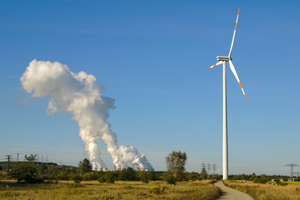
Cross posted from the Emerson Collective »
"I like coal."
Governor Romney's love note to the coal industry during the first presidential debate in Denver gave rise to a tidal wave of Tweets and blog posts. It's been widely panned by environmental groups and lauded by the fossil fuel industry -- in fact, shares in several mining companies actually rose the following day. 
Governor Romney confirmed his affections during the second debate, declaring, "I will fight for oil, coal and natural gas."
At first blush it seems easy to judge the debates, and in fact the whole election campaign, based on these statements alone. Like fossil fuels? Vote Romney. Don't like fossil fuels? Vote Obama.
But of course it's not that easy. In actual fact, anyone taking a hard look at the United States's energy mix would have to conclude that we all like fossil fuels. Take coal. Right now, most of our electricity comes from coal. Even in California, where we like to think we've weaned ourselves off coal because we burn so little of it, we still import coal-fired power to our state -- enough to generate, as recently as 2005, over 20 percent of the electricity we use.
At the same time, anyone tracking America's energy mix over time would have to conclude that while we have liked coal a lot, we maybe like it a little less now. The combination of new natural gas discoveries, the increasing use of renewable energy in many states, and people using less electricity overall has led to an actual decline in coal use in the U.S. to below 40 percent of U.S. power generation, from 42 percent last year and 57 percent in 1985.
And that's a good thing. We need to diversify our energy sources so we don't rely so much on just one volatile commodity, whether it's coal, petroleum or even natural gas. We need to turn to much cleaner and truly renewable power sources like wind and solar and geothermal, which we now know from the National Renewable Energy Laboratory could provide up to 80 percent of our total electricity generation. And we need to do all this not just because it's smart to widen our energy portfolio, but because it's imperative that we send less carbon into our fragile atmosphere.
So one way to think about this is that in the past, we liked coal a lot, but in the future, we need to look for alternatives. Making the real question this election season: do we want an energy policy that takes us into the past, or one that moves us into the future?
The two presidential debates provide a glimpse into the candidates' intentions. While Governor Romney proclaimed his love for coal in Denver, he also said he likes "green energy" -- while cautioning against any government support for it. The President, for his part, generally spoke in favor of "developing American energy" and of ending tax breaks that have subsidized oil and gas extraction for a century -- and helped build up one of the most profitable industries in the world in the process.
These trends continued through the second debate, with the candidates engaging in a spirited discussion over drilling, but where the president's overarching message was that "[W]e've got to make sure we're building the energy source of the future, not just thinking about next year, but ten years from now, 20 years from now." Governor Romney, for his part, stuck to his guns: "Let's take advantage of the energy sources we have."
The president is looking to the future. The governor is looking to the past. That's a critical difference.
But the debates also highlighted a striking -- and disturbing -- similarity between the candidates: over the course of two debates, one on the economy and one on a range of domestic policy issues, neither candidate even once mentioned climate change -- the single biggest threat to our economy and our current way of life.
At the end of the day, it's the climate that matters. For my part, I'm voting for the energy strategy that helps save it.